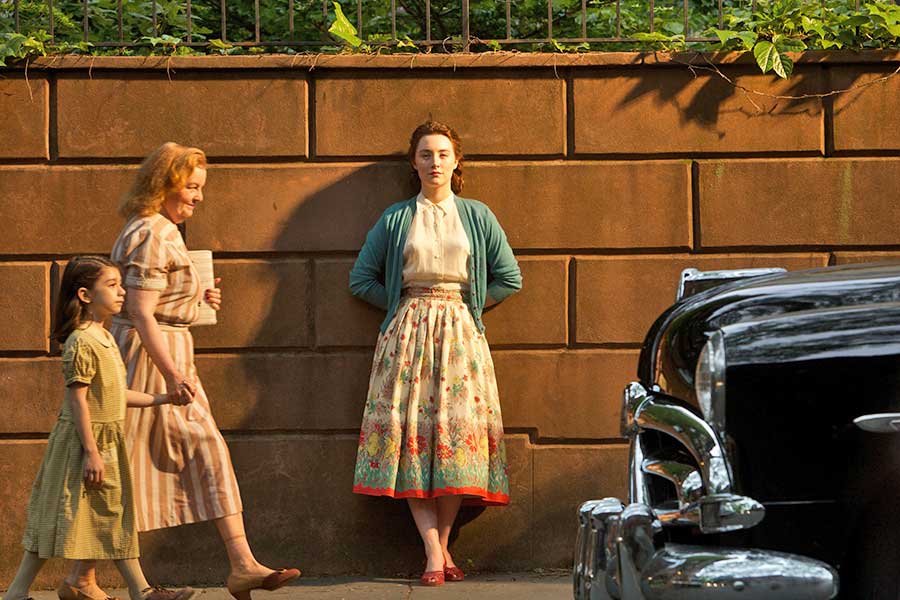Two very different but worthwhile films — both with queer origins, and both set in the 1950s — open Nov. 20 at Ritz Theatres. One is a documentary about actor Tab Hunter and the other, “Brooklyn,” is an adaptation of gay author Colm Tóibín’s novel.
“Tab Hunter Confidential” is an affectionate hagiography that chronicles the life and career of the swoon-inducing Hunter, nicknamed the “Sigh Guy.” The film shows how Hunter (born Arthur Kelm) parlayed his good looks into opportunities to develop as an actor, and get under contract at Warner Brothers. His carefully managed career involved studio-approved dates with Natalie Wood and other actresses. Yet while Hunter played along, he tried to keep his relationships with figure skater Ronnie Robertson and actor Anthony Perkins on the QT.
The film exposes the intricacies of Hunter’s double life on screen and off, but it is the poignant moments, such as various family and personal crises Hunter experienced, that best reveal his true nature. When he breaks his studio contract to forge his own career, he finds work hard to come by and performs in dinner theater before making John Waters’ “Polyester,” which resuscitated his career and ultimately helped him meet the love of his life, Allan Glaser, who produced this film.
“Tab Hunter Confidential,” based on the book of the same name, does not dish much dirt or provide any new insights into how gay men fared in the 1950s — but this is in part because the actor is a gentleman and does not discuss such things. Hunter is extremely likable on screen and the film’s nostalgia factor compensates for its more superficial moments. Fans will also enjoy the images of the screen idol in various photographs and film clips, as well as interviewees ranging from Waters and George Takei to Portia de Rossi and his “Lust in the Dust” co-star, Lainie Kazan.

“Brooklyn” is an exquisite and extraordinary drama about Eilis Lacey (Saoirse Ronan), a young woman in 1952 Ireland who is sent to America by her sister, Rose (Fiona Glascott), so she can have a better life. Everything Eilis owns fits in one suitcase. As she makes the voyage on ship, it is a rough journey. But when she arrives in Brooklyn, director John Crowley closes in on Eilis’ face and then provides a shot of the New York City skyline that signifies this exciting new world. When Eilis steps through a door into America, it is a truly transporting moment. It is one of the film’s many remarkable and affecting scenes.
If Eilis’ life at a boarding house — run by the wonderfully fussy but tender Mrs. Kehoe (Julie Walters) — her job at a department store and her bookkeeping classes at Brooklyn College do not quite cure her palpable homesickness, the young woman eventually does find some pleasure with a charming young Italian man, Tony (Emory Cohen), whom she meets at an Irish dance. It is around the time when the couple starts to get serious that “Brooklyn” introduces a plot development (that should not be revealed) that turns the film on its axis.
Crowley, working from a script by Nick Hornsby, generates considerable emotion, suspense and yes, tears, as Eilis grapples with having one foot in the homeland and one foot in the new land. The film charts her coming-of-age through her dresses, which become more brightly colored as Eilis gains confidence and radiance.
Ronan is absolutely fantastic in the lead role. Her expressive face conveys the considerable (and mixed) emotions she has as the savvy Eilis grapples with problems of loneliness, heartache and finding her independence.
“Brooklyn” may tug at the heartstrings, but the film is so well-made that the strong emotions never feel manipulated. Viewers will be moved because they care so deeply about the characters. The film is well cast, down to the smallest of roles, from the young ladies at the boarding house to a wicked Irish shop owner, Miss Kelly (Brin Brennan), and Tony’s smartass younger brother, Frankie (the scene-stealing James DiGiacomo).
But what makes the film so satisfying is how involving the storytelling is. Every detail, from the costumes to the sets — a sequence at Coney Island feels authentic — to the fabulous cinematography by Yves Bélanger, is perfection. The contrasts between Ireland and America, such as the beaches, the streets and the people, also come across clearly, without feeling as if viewers are being hit over the head with the differences. This makes Eilis’ situation and her decision so fraught with drama and tension, meaning and heartbreak.
Crowley and Ronan’s magnificent efforts are what make the film so heart-wrenching. It is almost a spoiler to say the rapturous “Brooklyn” is a tear-jerker, but viewers who succumb to its magic will be crying happy tears.

